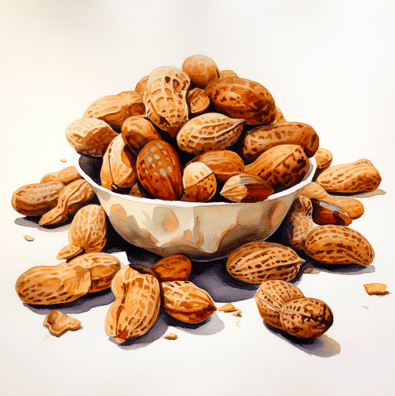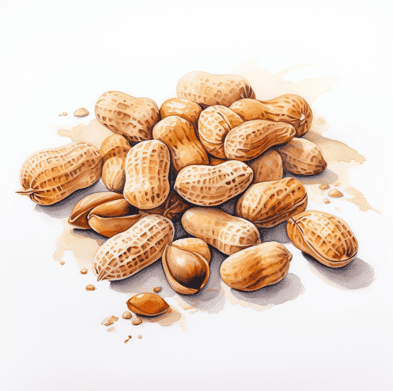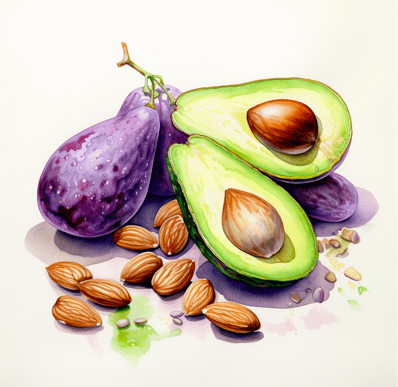
Do peanuts cause pimples?
The link between peanuts and acne varies among individuals. While some may experience acne flare-ups from eating peanuts or peanut butter, others may not notice any skin changes. It’s essential to observe your own skin’s reaction to peanuts for personalised skincare.
ABOUT ME
Be beauty. Be plant-based!
As a former Registered Nurse and avid plant-muncher, I’m in love with how simple plant-based foods make it easy to be beautiful.

You’ll also love:
Beyond Breakouts: How to Be Confident With Acne
Roasted Peanuts: How Long Do They Last?
How to Freeze Boiled Peanuts Perfectly Every Time!
Hello beautiful! Today, we delve into a question: Do peanuts cause pimples? It’s a concern that combines worries about diet and skincare, particularly for those striving for clear, healthy skin. Let’s understand the relationship between what we eat and how our skin behaves.
Understanding Acne
Acne is not just a skin issue; it’s a reflection of various internal factors, including the activity of your oil glands and hormonal imbalances. When these glands produce excess oil, it can lead to clogged pores and acne. Hormonal acne, specifically, arises from fluctuations in your body’s hormones. It’s also crucial to recognise that acne breakouts are not just about oily skin; they also involve dead skin cells that can block pores and cause inflammation.
Another critical aspect to consider is inflammatory acne. This type of acne is characterised by red, swollen pimples that arise from an inflammatory response in the skin.

It’s important to understand that acne isn’t just a surface-level problem. It’s often a sign of underlying issues, such as hormonal changes that affect sebum production. Sebum, the natural oil produced by the skin, is crucial for keeping our skin healthy. However, when produced in excess, it can lead to oily skin and acne.
In summary, understanding acne is the first step towards managing it. Recognising that factors like oil glands, hormonal imbalances, and dead skin cells play a significant role can help us approach acne management more effectively. In the following sections, we’ll explore how peanuts fit into this picture and what steps you can take for clearer, healthier skin.
You’ll also love:
Cashews and Acne: Snackable Delights or Skin Saboteurs?
Do Peanuts Cause Pimples?
The debate about whether peanuts or peanut products lead to acne breakouts is quite intriguing. Peanuts, a staple snack for many, contain an ingredient known as peanut agglutinin. This substance, along with high levels of Omega-6 fatty acids found in peanuts, could potentially influence acne development. Omega-6, while essential for health, is known for its inflammatory properties, which can exacerbate acne flare-ups.

Additionally, it’s important to consider how peanut butter consumption fits into this discussion. Many peanut butter brands add sugars and oils, which probably are the culprit of acne formation.
However, it’s crucial to remember that not everyone’s skin reacts the same way to peanuts or peanut butter. While some might experience an increase in pimples, others may not notice any significant change.
You’ll also love:
Peanut Butter & Acne: Is it Your Friend or Foe?
Dietary Influence on Skin Health
Your diet plays a vital role in managing your overall skin health. Foods known to trigger acne are often termed as acne-causing food. Apart from peanuts, there are other foods which might prompt an inflammatory response in the skin, leading to acne.
This includes dairy products, high sugar foods, and oily food. Such foods can cause fluctuations in blood sugar levels, leading to hormonal changes that might increase oil production in the sebaceous glands, thereby causing pimples.
Therefore if you’re eating fried peanuts and are worried about the peanuts causing you acne, it may really be the oil used for frying leading to acne.
In the context of a healthy diet, it’s essential to focus on whole foods and steer clear of the worst food culprits for acne (such as skim milk). Replacing problematic foods with healthier alternatives can significantly impact your skin’s health.
Further, including foods rich in antioxidants, low in sugars, and high in essential nutrients can help maintain a balance in your skin, leading to clearer skin.
In the next sections, we’ll explore the nutritional aspects of peanuts and how they might affect your skin, along with providing alternative food options for those with acne-prone skin.
You’ll also love:
The Nutty Truth: Munch More Nuts to Weigh Less!
Peanuts’ Nutritional Profile
Let’s dive into the nutritional content of peanuts and how it relates to acne. Peanuts are rich in essential fatty acids and vitamin E, both of which are beneficial for overall skin health.

However, the key lies in the balance of these nutrients. Peanuts have high levels of omega-6 fatty acids, which, in excess, can contribute to oily skin and acne outbreaks. This imbalance can trigger an increase in oil production from the sebaceous glands, potentially leading to clogged pores and pimples.
Moreover, the role of peanut agglutinin in acne is worth noting. This component in peanuts can impact the gut and, subsequently, the skin.
A healthy gut is often reflected in healthy skin, so any imbalance caused by such substances can exacerbate skin issues. It’s a delicate balance – while peanuts offer health benefits, their impact on skin, especially for those prone to acne, can be quite significant.
Alternatives for Clearer Skin
If you have acne-prone skin and think peanuts are linked to it, finding snacking alternatives to peanuts is key. Especially for sugary peanut products or friend peanuts.
Opting for whole foods that are low in sugar and unhealthy fats can be beneficial. Foods like fresh fruits, whole grains, and other nuts with lower omega-6 content can be better alternatives. These foods not only support overall health but also contribute to clearer skin.

Incorporating foods high in omega-3 fatty acids, which have anti-inflammatory properties, can also be helpful. For example, adding flaxseeds, chia seeds, and walnuts to your diet can provide essential fatty acids that promote healthy skin.
Additionally, focusing on a diet rich in vegetables, fruits, and lean proteins can ensure you get a wide range of nutrients without the negative effects associated with high-glycemic or oily foods.
Managing Acne Effectively
To manage acne, it’s crucial to adopt a skincare routine that targets the root causes of acne.
Washing your face twice a day with a gentle cleanser helps remove excess oil and dead skin cells, preventing them from clogging the hair follicles. It’s also important to use non-comedogenic products, which don’t block pores. Remember, picking or squeezing pimples can worsen acne, so it’s best to avoid this.
In terms of diet, it’s wise to limit intake of acne-triggering foods. This includes reducing consumption of oily food, dairy products, and high glycemic foods like white bread and ice cream, which can spike your blood sugar levels. Incorporating whole grains and foods with a lower glycemic index can help manage acne from the inside out.
Beyond Diet – Comprehensive Skincare
Combating acne isn’t just about diet; it involves a holistic approach to skincare and health.
Managing chronic inflammation and hormonal changes is key. This can be achieved through good skincare habits, such as regular cleansing and moisturising with products suited to your skin type.

Furthermore, lifestyle factors like stress management and getting enough sleep play a crucial role in maintaining healthy skin.
Regular exercise, adequate hydration, and a balanced diet contribute to your overall skin health and can help in achieving clearer skin.
Do peanuts cause pimples?
In wrapping up our questioning do peanuts cause pimples, it’s essential to understand that the connection between peanut products and acne outbreaks varies from person to person. While some may experience acne flare-ups after consuming peanuts or peanut butter, others may not see any change in their skin condition.
It’s crucial to pay attention to your body’s response to these foods and make dietary choices that align with your skin type and overall skin health. Beyond diet, achieving clear skin also involves a comprehensive skincare routine, balanced lifestyle, and stress management. So, when pondering the question, “Do peanuts cause pimples?”, remember, it’s a complex issue that depends on individual skin responses and overall health practices.
References
Amarowicz R, Pegg RB. Tree Nuts and Peanuts as a Source of Natural Antioxidants in our Daily Diet. Curr Pharm Des. 2020;26(16):1898-1916.